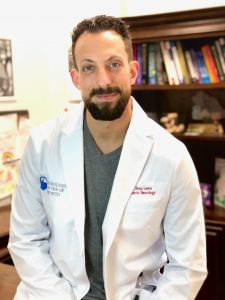Dr Evan Lewis, a paediatric neurologist and founder of the Neurology Centre of Toronto (NCT), has treated hundreds of epilepsy patients, for whom there is no doubt that cannabis is medicine.
I’m a paediatric neurologist and epilepsy specialist, with over 500 adult and paediatric patients in my practice currently being treated with medical cannabis for epilepsy and a broad range of other neurological conditions.
For these patients, there is no doubt that cannabis is medicine.

Dr Evan Lewis
As a start, five major randomised controlled trials have been completed, with recently published follow-up data, in complex, drug-resistant paediatric epilepsy. These studies show that medical cannabis exerts the same degree of anti-seizure control as our traditional anti-seizure drugs, with comparable side-effect profiles.
It might also be helpful to point out that cannabis, in the form of a purified CBD oil called Epidiolex®, has been approved as a medical treatment for certain types of epilepsy in children by the FDA in the US, the EMA in Europe, and NICE/MHRA in the UK.
I can personally share numerous stories of the children I have treated with unrelenting seizures who, after failing multiple medications for several years, finally responded to cannabis.
However, none of that is needed.
While there may be some subjectivity inherent in the management of pain and anxiety, the clear effects that cannabis can produce in drug-resistant epilepsy are difficult to argue.
A child is either seizing or they are not. The child is treated with a cannabis oil. The seizures stop.
If that is not a medicine, then what does one tell the parents of these children they are giving to their child.
Here in Canada, there is a well-defined medical pathway within the Cannabis Act that provides a mechanism by which patients can undergo a consultation with a physician or nurse practitioner and be provided medical direction, oversight, follow-up and medical authorisation to receive the treatment.
In the UK too, cannabis for medicinal purposes was legalised in 2018. There are now over 10,000 patients prescribed cannabis-based medicines, including about 150 children with drug-resistant epilepsy, according to the Medical Cannabis Clinicians Society.
The majority of these children are thriving, several have now been seizure-free for a prolonged period of time, and all have seen dramatic improvements in their quality of life.
Despite the above and years of medical legalisation, families who seek cannabis treatment after trying numerous options are still met with reluctance on the part of the health care system. Some of that reluctance lies in the challenges that practitioners perceive with cannabis products and safety.
Producing a consistent cannabis product from batch-to-batch is one of the many challenges faced by licensed producers of cannabis, but that should not serve as rationale to delegitimise cannabis as a medicine or pressure families to feel compelled to work with medications they feel will not work for their child. This only works to reinforce inaccessibility, and children should not be the ones to suffer because of these challenges.
Reflexively turning away from the medical potential of cannabis for epilepsy does a great disservice to the many children and families struggling with the condition.
The opinion that cannabis is not a medicine is not only outdated but is also dangerous.
Dr. Evan Cole Lewis is a Neurologist and Clinical Neurophysiologist with expertise in paediatric neurology and epilepsy. He is the founder and medical director of the Neurology Centre of Toronto (NCT) and VP Psychedelic Neurology at Numinus. He is assistant professor with the Department of Paediatrics at the Hospital for Sick Children and the University of Toronto.
Estimated reading time: 4 minutes
- It is “highly unsafe” to switch children’s cannabis medicines, says leading epilepsy expert
- The men in mental health: “I felt a sensation and realised this is what happiness feels like”
- “Children’s lives are at risk” – let GPs prescribe medical cannabis, says paediatric neurologist
- “BPNA rules deny safe treatment for children”– clinicians write open letter to Sajid Javid
- ‘Crisis’ in paediatric access to medical cannabis forcing parents to black market
The post Cannabis is medicine – just ask people with epilepsy appeared first on Cannabis Health News.

